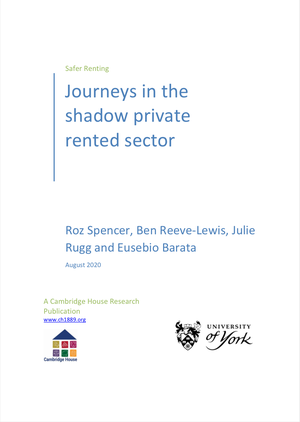In the last ten years, London has been a favourable context for the growth of criminality in the PRS: rents are high relative to property quality; market pressures create a tolerance for overcrowding amongst tenants; there is a growing population of economic migrants; cutbacks in enforcement; an unwieldy legal framework; poor support for tenants seeking legal recourse; low penalties for convicted offenders; and growing use of the internet where identities are harder to verify.
This report from Safer Renting at Cambridge House and the University of York, funded by Trust for London, sets out a range of recommendations for how policymakers should take urgent action to tackle the bleak picture facing people stuck in the low-income private rental sector.
Limited research has directly explored criminality in the PRS, although third-sector data indicates that tenant experience of illegal eviction, harassment and abusive and threatening behaviour from landlords is not uncommon.
This research draws from Safer Renting’s case study data, interviews with London-based stakeholders and interviews with tenants who have had direct experience of landlord and letting agent criminality. All research took place before March 2020.
Three themes from the report are worth highlighting.
First, that law-enforcement agencies need to do more to prevent illegal evictions, making better use of existing powers within the Protection from Eviction Act 1977 and taking advantage of temporary powers available to police during the COVID-19 crisis.
Second, a new regulatory framework is required to oversee the private rental sector, with a particular focus on providers of low-income tenancies.
Third, that poor housing has contributed to the unacceptably low levels of progress towards equality for people of BAME origin – addressing the impact of poor quality, multi-occupancy and insecure housing is an essential part of the response to structural inequalities highlighted by the Black Lives Movement.
The report makes twelve recommendations, for the government, local authorities, the Crown Prosecution Service and the Metropolitan Police Service.
The Government should:
- Place a duty (not just a power) on the police to enforce the provisions of the Protection from Eviction Act 1977.
- Create a fund to support local authorities in recruiting expertise and capacity to pursue civil penalties under the Housing and Planning Act 2016.
- Place a legal requirement on online platforms that host private rentals adverts to police criminal activity by disabling offending accounts and give clear advice on how private tenants can protect themselves from criminal landlord and letting agent behaviour.
- Introduce a duty on local authorities to prepare local multi-agency strategic housing plans that include provisions for joint working that cover housing options, homelessness and regulation of the PRS, Planning, Trading Standards and policing to detect and prosecute landlords’ and agents’ criminal behaviour.
- Amend housing legislation to introduce joint and several liability for housing offences to include the property owner.
- Remove Section 21 ‘No Fault’ evictions and replace Assured Shorthold Tenancies with longer, fixed-term tenancies, with a duty on landlords to provide written tenancy agreements that comply with statutory requirements.
- Introduce a right to expert statutory advocacy for private renters faced with criminal behaviour by landlords.
Local authorities should:
- Adopt targeted means to detect unlicensed HMOs, including expanding data-sharing and monitoring all on-line platforms advertising private rentals.
- Work with the police more proactively to enforce the Protection from Eviction Act 1977, and actively pursue prosecutions of offenders in such cases.
The Crown Prosecution Service should:
- Institute procedures for centralising data collection and reporting on illegal evictions.
The Metropolitan Police should:
- Work with councils to make more active use of powers to enforce the Protection from Eviction Act 1977.
- Review its training around evictions.

02 September 2020